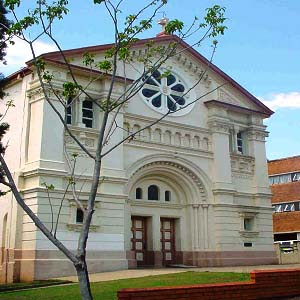 Church row escalates as priest denies Jesus was God
Church row escalates as priest denies Jesus was GodTHE controversy surrounding one of Australia's most radical Catholic churches, St Mary's South Brisbane, has escalated into a wider debate over bedrock Christian beliefs.
On the line for parishioners of St Mary's and several other parishes in Queensland and NSW are fundamental church doctrines such as who can celebrate Mass, whether Jesus Christ was God, whether Mary had as many as six children, the bodily Resurrection, and the need for sacramental celebrations for same-sex marriages.
In a booklet being sold for $20, a NSW priest, Peter Dresser of Coonamble in the Diocese of Bathurst, insists Jesus was not God and did not think he was God. The booklet is on sale at two Brisbane parishes: St Mary's and the Wooloowin/Windsor/Kalinga Parish of outspoken Brisbane priest Richard Pascoe.
In God is Big. Real Big! Father Dresser -- who prefers to be known as Peter -- says: "This whole matter regarding Jesus being God ... not only does violence to my own intelligence, but must be a sticking point for millions of people trying to make some kind of sense of the Christian religion ... No human being can ever be God, and Jesus was a human being. It is as simple as that."
Father Dresser said he found his own rural flock "very conservative" and admitted that many of them found his theology difficult to accept. He said he had rethought his approach after taking an interest in science. "I'm delighted they're opening up the debate at St Mary's," he said.
In his book, Father Dresser claims Mary had as many as six children, Joseph was the father of Jesus and the bodily Resurrection is not to be taken literally.
Sydney lecturer in church history, Anthony Robbie, said Father Dresser's claims defied all scriptural evidence.
"What a breathtaking know-all, to claim he knows the mind of Christ contrary to scripture and tradition. His words rob Christianity entirely of its meaning and purpose," Father Robbie said.
"The Council of Nicaea settled the question that Christ was God in 325, so he is 1700 years out of date. The rest is a regurgitation of every discredited 19th-century liberal Protestant German cliche in the book."
Recently, the priests at St Mary's -- Peter Kennedy and Terry Fitzpatrick -- also canvassed the idea of Catholics celebrating the Eucharist in their homes, without a priest.
A discussion paper handed to parishioners by Father Kennedy and written by Charles Kelliher said the lack of priests in the 21st century should prompt the faithful to look back to the first 200 years of the church, before the priesthood and the church hierarchy came into existence.
"Like the house church of the first 200 years, it is the community of believers who can concelebrate and bring about the presence of Christ in the eucharistic celebration. Let us embark on the journey as a community of believers in the modern day house church.
"The community of believers would call forth one of its members to preside at this memorial service. This person could be either man or woman, married or single ... with no special designation except being chosen or called forth to leadership by the community."
The director of adult education in the Archdiocese of Sydney, Opus Dei priest John Flader, said the earliest celebrants of the Eucharist were called presbyters, a Greek word meaning elders, but they had been appointed by the laying-on of hands by a bishop, and there was no evidence that women took such roles. "Even as early as around 100AD, Pope Clement I wrote to the church in Corinth setting out the authority of Rome over the local church, including the presbyters," Father Flader said. "Suggesting that lay people gather in homes today and pick someone to celebrate the Eucharist is absurd. It would never be valid."
St Mary's has continued with Eucharistic prayers celebrated by the congregation with women leading much of the mass. Recent preachers have included "community jester" and activist Tony Robertson.
While some argue that St Mary's should be closed, some priests say this would drive the teachers who attend the church towards informal services at home, which could influence the children they teach. "They say they regard themselves as Catholic so it would be better to ensure they conform to the Church's teachings and practice. These are not optional," said one.
Link (here)
Photo is of St. Mary's in Brisbane
Read Fr. Z's frank commentary on the subject (here)










